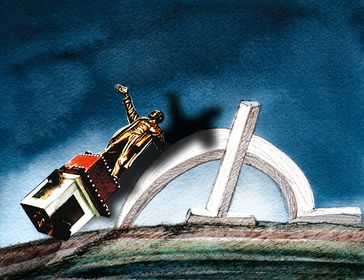You absolutely don’t have to be an admirer of Vladimir Ulyanov, or Lenin—as the Soviet legend came to be known—to unequivocally condemn vandalism and mob violence. In Tripura, the razing of a statue built to commemorate the communist revolutionary, political thinker and leader of the October Revolution, was a shameful and unjustified moment of hooliganism by triumphalist crowds. The image of a bulldozer bringing Lenin down, as supporters of the BJP cheered on, cast an avoidable shadow over the party’s historic victory in the north-eastern state, where it decimated the left to capture more than 40 per cent of the vote share on its own. Worse, it led to copy-cat arsonist assaults elsewhere, including defiling the statues of Ambedkar, Periyar and Syama Prasad Mookerjee. Coarse competitiveness had now covered the gamut from left to right.
The debate that followed has been bewildering. While almost everyone agrees that what started in south Tripura emboldened prejudice and lumpenism—and there are no ifs and buts in my forceful condemnation of that—why must that lead to the disingenuous and obligatory romanticisation of Lenin? There have been exaggerated comparisons made between Lenin and Mahatma Gandhi. It has been pointed out that Bhagat Singh was reading Lenin right before he was executed. And, any suggestion that Lenin does not quite merit a place in India’s pantheon of heroes has been met with violent disdain from the liberal left. Quite apart from the fact that repeated electoral disasters prove how anachronistic the Marxists have become in contemporary India, Lenin’s record as a radical and significant thinker is blemished by his years as a ruthless authoritarian. A biography of the ‘Great Leader’ called Lenin the Dictator by Victor Sebestyen describes him as the “godfather of post-truth politics”, just a hundred years earlier. Above all, to me, despite his philosophical inspiration to Indian revolutionaries, he has no India connection important enough to be organic in any way to the country’s cultural or intellectual evolution. This is not xenophobia; we are after all, at least partly, shaped and formed as a nation from years of colonisation. But, you have to wonder why Lenin has over-stated importance in the country’s iconography, when there are so many architects of Free India—from all ideological shades—we could revere instead.
Does that mean his statue should have been brought down? No, absolutely not. Parallels have been drawn with the removal of Lenin statues in the hundreds, in Ukraine, or East Germany, or with the removal of Confederate monuments and memorials in the United States (for being racist symbols of white supremacists.) My own view is that this debate is wasteful and unnecessary. Why not allow history to evolve, grow, breathe and examine itself organically, instead of going by the fiat or diktat of changing governments and their ideologies. In any case, statues don’t have to be marks of respect, they can simply be about moments in time.
But, if the political symbolism of an icon comes to be unacceptable over the years, and in the face of newer social values, the way to change this must only be through legislation. So, if the BJP government wanted to remove Lenin’s monument, it should have passed a resolution in the assembly and proceeded by law. That is the difference between a democracy and a mobocracy. And, I would have condemned the crowd-violence as an act of shameful bullying—irrespective of whose the statue was, and who the perpetrators were. It’s the principle of law and order, and the capacity to accept diverse points of view that are the hallmarks of modern nations.
Personally, I think our politicians should have better things to do than to debate the past. Countries that fight over statues are quite literally frozen in time.
editor@theweek.in


